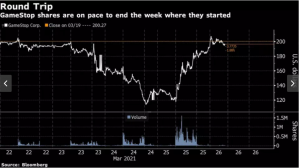Goldman Sold $10.5 Billion of Stocks in Block-Trade Spree
Bei Hu, Gillian Tan and Drew Singer, 27 March 2021
 (Bloomberg) — Goldman Sachs Group Inc. liquidated $10.5 billion worth of stocks in block trades on Friday, part of an extraordinary spree of selling that erased $35 billion from the values of bellwether stocks ranging from Chinese technology giants to U.S. media conglomerates.
(Bloomberg) — Goldman Sachs Group Inc. liquidated $10.5 billion worth of stocks in block trades on Friday, part of an extraordinary spree of selling that erased $35 billion from the values of bellwether stocks ranging from Chinese technology giants to U.S. media conglomerates.
The Wall Street bank sold $6.6 billion worth of shares of Baidu Inc., Tencent Music Entertainment Group and Vipshop Holdings Ltd. before the market opened in the U.S, according to an email to clients seen by Bloomberg News.
That move was followed by the sale of $3.9 billion of shares in ViacomCBS Inc., Discovery Inc., Farfetch Ltd., iQiyi Inc. and GSX Techedu Inc., the email said.
More of the unregistered stock offerings were said to be managed by Morgan Stanley, according to people familiar with the matter, on behalf of one or more undisclosed shareholders. Some of the trades exceeded $1 billion in individual companies, calculations based on Bloomberg data show. Continue reading “Article: Goldman Sold $10.5 Billion of Stocks in Block-Trade Spree”

 The head of security in Shengjin Harbor, Agostin Gjini was handcued this Saturday after almost 6 months of investigation, as he is accused of alienation of property. Agostin Gjini is suspected that during the exercise of his duty as head of the Archive and Protocol Sector in the former commune of Shengjin, he falsied documents, alienating a land area on the coast of Shengjin, from the type of sand land to field property.
The head of security in Shengjin Harbor, Agostin Gjini was handcued this Saturday after almost 6 months of investigation, as he is accused of alienation of property. Agostin Gjini is suspected that during the exercise of his duty as head of the Archive and Protocol Sector in the former commune of Shengjin, he falsied documents, alienating a land area on the coast of Shengjin, from the type of sand land to field property. Last week a series of arrests and property seizures across the Auckland region hit the headlines, the culmination of an extensive investigation by the New Zealand Police’s Financial Crime Group into money laundering and related crimes.
Last week a series of arrests and property seizures across the Auckland region hit the headlines, the culmination of an extensive investigation by the New Zealand Police’s Financial Crime Group into money laundering and related crimes. While non-fungible tokens (NFTs) are certainly the big thing in crypto at the moment, they aren’t without their problems. Aside from accusations of hype and faddishness, NFTs also raise the familiar and thorny issue of money laundering.
While non-fungible tokens (NFTs) are certainly the big thing in crypto at the moment, they aren’t without their problems. Aside from accusations of hype and faddishness, NFTs also raise the familiar and thorny issue of money laundering. Figueroa is accused of laundering $ 3.7 million of public funds in the presidential administration of the convicted Elias Antonio Saca.
Figueroa is accused of laundering $ 3.7 million of public funds in the presidential administration of the convicted Elias Antonio Saca. GameStop Takes $6 Billion Round Trip as Results Shrugged Off
GameStop Takes $6 Billion Round Trip as Results Shrugged Off Investment scam reports surged by almost a third (32%) during 2020, with losses to these scams increasing 42% to £135.1m, according to a report by trade body UK Finance.
Investment scam reports surged by almost a third (32%) during 2020, with losses to these scams increasing 42% to £135.1m, according to a report by trade body UK Finance.